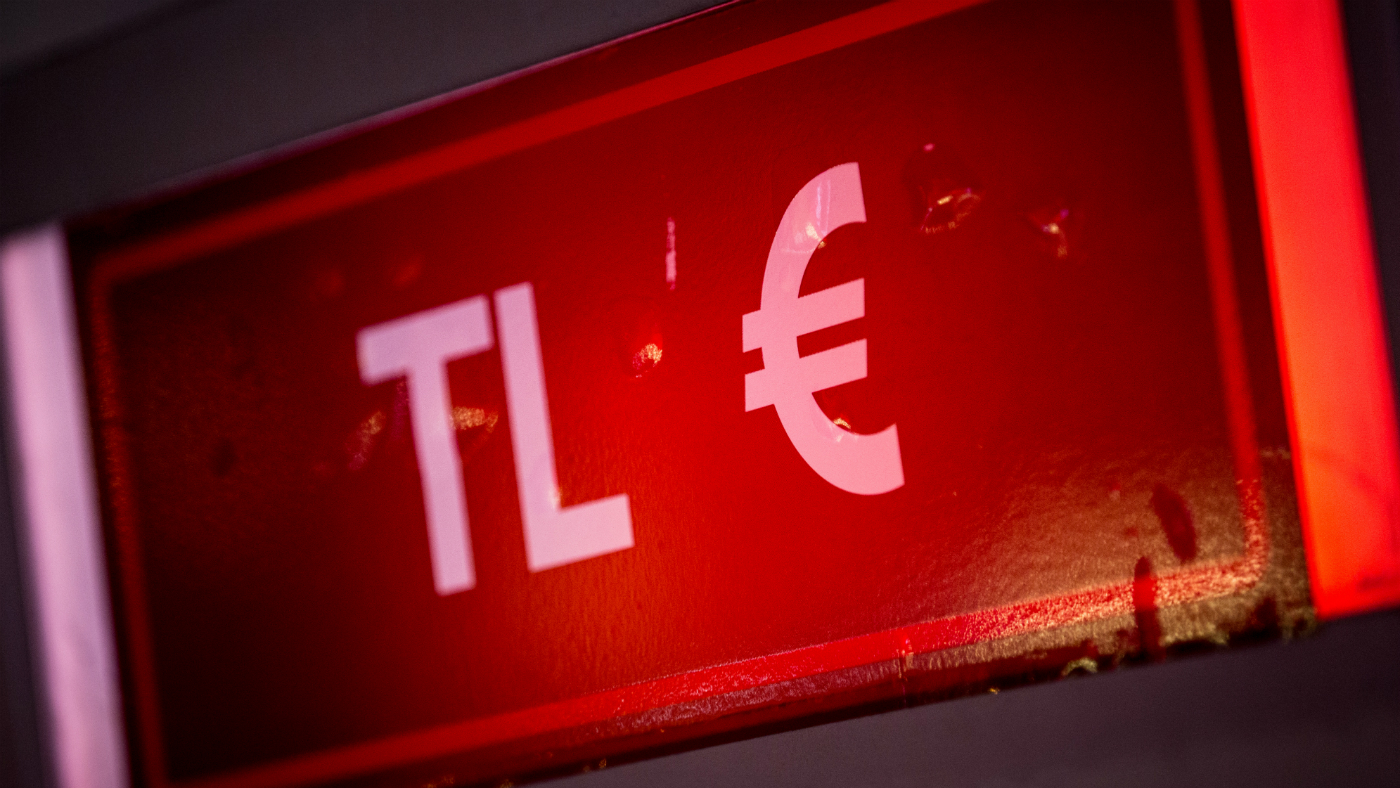Turkish lira plummets: the potential effects on world markets
Experts warn of global knock-on as US pushes aluminium and steel tariffs against Ankara

A free daily email with the biggest news stories of the day – and the best features from TheWeek.com
You are now subscribed
Your newsletter sign-up was successful
The Turkish lira has hit record lows after dropping almost 9% in early trading on Monday, fuelling fears that the country’s economic downturn may trigger a global crisis.
Turkey’s economy has been in dire straits since mid-2017, largely thanks to extremely high inflation rates, trade tariffs from the US and government borrowing from foreign countries. The lira fell by a fifth against the dollar last week alone, but “even before the current crisis dropping, the lira was the world’s worst performing currency, by almost 50% against the dollar in the past 12 months”, The Guardian reports.
This weekend Turkish President Recep Tayyip Erdogan called on Turks to help support the lira by selling their dollars and euros. “If there are dollars under your pillow, take these out,” he told supporters at a rally in the northeastern Turkish town of Unye.
The Week
Escape your echo chamber. Get the facts behind the news, plus analysis from multiple perspectives.

Sign up for The Week's Free Newsletters
From our morning news briefing to a weekly Good News Newsletter, get the best of The Week delivered directly to your inbox.
From our morning news briefing to a weekly Good News Newsletter, get the best of The Week delivered directly to your inbox.
“If there are euros, take these out … immediately give these to the banks and convert to Turkish lira and, by doing this, we fight this war of independence and the future. Because this is the language they understand,” Erdogan continued.
The BBC reports that the current crisis is “pushing up prices on everyday items” but adds that exchange rates will now work in favour of tourists heading to the country.
However, experts paint a bleaker picture, warning that global markets may face major ramifications as investors try to assess the impact of the crisis on European banks that have lent money to Turkey.
What has happened in Turkey?
A free daily email with the biggest news stories of the day – and the best features from TheWeek.com
A combination of factors have led to the current crisis in Turkey.
The currency was hit hard by a failed coup against Erdogan in 2016, starting a lengthy period of decline that was accelerated by a controversial referendum last summer that made Erdogan a “dictator in all but name” and by the subsequent appointment of his son-in-law to head the Finance Ministry.
The Guardian reports that the country is “running a current account deficit, combined with high levels of debt in the private sector and significant foreign funding in the banking system”.
Inflation reached an annual rate of 15.9% in July – more than five times the average rate for wealthy nations – and “government borrowing in foreign currencies has risen dangerously high”, the newspaper adds.
Now, the lira has plumbed new depth, after US President Donald Trump confirmed on Friday that he had approved the doubling of tariffs on Turkish steel and aluminium following the detention in Turkey of US evangelical pastor Andrew Brunson on terrorism charges.
On top of this, investors are worried that Turkish companies that “borrowed heavily to profit from a construction boom” may “struggle to repay loans in dollars and euros, as the weakened lira means there is now more to pay back”, further exacerbating the slide, the BBC adds.
What does this mean for the world?
Experts have warned that this may not be a localised crisis. This morning other emerging market and high-yielding currencies tumbled across the board, “despite the fact Turkey accounts for just one percent of the world economy”, The Daily Telegraph reports.
The crash saw European markets fall sharply when markets opened, particularly in countries with banks exposed to the Turkish currency, such as Spain’s BBVA, Italy’s UniCredit and France’s BNP Paribas. On Friday, the FTSE fell 75 points, while Germany’s Dax ended the day down 2%.
Reuters reports that emerging market currencies continue “to reel as investors worry about contagion”, exemplified by the South African rand, which dropped 3.1% this morning, while the Russian rouble dropped 0.8% and the Mexican peso 1.5%.
Elsewhere, the euro fell to as low as $1.1365, a 13-month low, before recovering to trade down 0.2% to $1.1382. The dollar, which has rallied in the Turkish lira crisis, gained 0.1% to 96.463 against a basket of major currencies, Reuters adds.
The yen surged 0.6% to 110.265 after earlier hitting a six-week high of 110.11, and the Swiss franc rose 0.5% to $1.1288.
But why the knock-on effect?
“For a start, it is a relatively big country, with a population of 80 million and an economy four times as big as neighbouring Greece,” says economics expert Larry Elliott. “What the financial markets are looking for are not diplomatic moves that demonstrate Turkey’s geopolitical importance but rather economic measures to prevent a potentially ruinous tsunami of selling over the coming days.”
Turkish Finance Minister Berat Albayrak has slightly stemmed the lira’s plummet by announcing that his government has drafted an economic action plan to ease investor concerns. Meanwhile, the country’s banking watchdog said that it had limited swap transactions.
All the same, the “big fear in the market is that we are headed for a full-blown emerging market crisis”, said Ulrich Leuchtmann, an FX strategist at Commerzbank in Frankfurt.
-
 ‘Restaurateurs have become millionaires’
‘Restaurateurs have become millionaires’Instant Opinion Opinion, comment and editorials of the day
-
 Earth is rapidly approaching a ‘hothouse’ trajectory of warming
Earth is rapidly approaching a ‘hothouse’ trajectory of warmingThe explainer It may become impossible to fix
-
 Health insurance: Premiums soar as ACA subsidies end
Health insurance: Premiums soar as ACA subsidies endFeature 1.4 million people have dropped coverage
-
 Is the EU funding Russia more than Ukraine?
Is the EU funding Russia more than Ukraine?The Explainer EU remains largest importer of Russian fossil fuels despite sanctions aimed at crippling Kremlin's war effort
-
 Fact check: can the US ‘devastate’ Turkey’s economy?
Fact check: can the US ‘devastate’ Turkey’s economy?In Depth Donald Trump is threatening the Nato ally with costly reprisals if Kurdish fighters are attacked in Syria